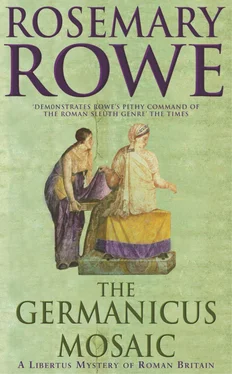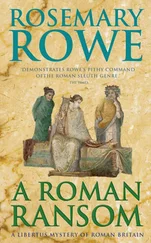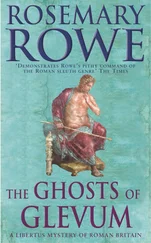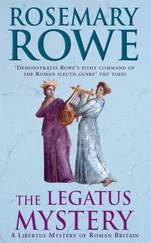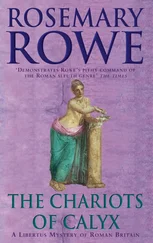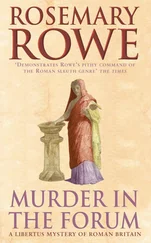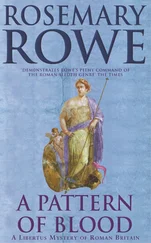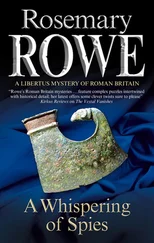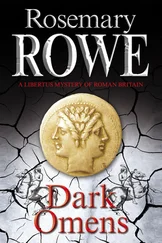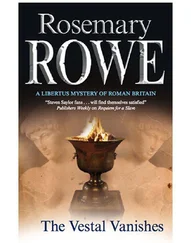Rosemary Rowe - The Germanicus Mosaic
Здесь есть возможность читать онлайн «Rosemary Rowe - The Germanicus Mosaic» весь текст электронной книги совершенно бесплатно (целиком полную версию без сокращений). В некоторых случаях можно слушать аудио, скачать через торрент в формате fb2 и присутствует краткое содержание. Год выпуска: 1999, ISBN: 1999, Издательство: Headline, Жанр: Исторический детектив, на английском языке. Описание произведения, (предисловие) а так же отзывы посетителей доступны на портале библиотеки ЛибКат.
- Название:The Germanicus Mosaic
- Автор:
- Издательство:Headline
- Жанр:
- Год:1999
- ISBN:9781472205056
- Рейтинг книги:5 / 5. Голосов: 1
-
Избранное:Добавить в избранное
- Отзывы:
-
Ваша оценка:
- 100
- 1
- 2
- 3
- 4
- 5
The Germanicus Mosaic: краткое содержание, описание и аннотация
Предлагаем к чтению аннотацию, описание, краткое содержание или предисловие (зависит от того, что написал сам автор книги «The Germanicus Mosaic»). Если вы не нашли необходимую информацию о книге — напишите в комментариях, мы постараемся отыскать её.
The Germanicus Mosaic — читать онлайн бесплатно полную книгу (весь текст) целиком
Ниже представлен текст книги, разбитый по страницам. Система сохранения места последней прочитанной страницы, позволяет с удобством читать онлайн бесплатно книгу «The Germanicus Mosaic», без необходимости каждый раз заново искать на чём Вы остановились. Поставьте закладку, и сможете в любой момент перейти на страницу, на которой закончили чтение.
Интервал:
Закладка:
Rosemary Rowe
The Germanicus Mosaic
Chapter One
As soon as I heard the voice, I knew there would be trouble.
‘Libertus? Libertus, the pavement maker? Are you there old friend?’ There was no mistaking those patrician Roman tones. Marcus Aurelius Septimus was here, come to my dingy workshop in person.
I was kneeling on the floor cutting pieces of tile for a mosaic at the time, but I clambered to my feet instantly. ‘Old friend’ I might be, but nobody — least of all a mere freedman — kept the provincial governor’s personal representative waiting, at least not if he was wise. Inwardly, though, I was cursing. I should have made a better sacrifice at the festival of Mars yesterday. It was only the third hour of the morning and already things were not looking good.
The arrival of Marcus worried me. Usually if he wants anyone he simply summons them to him. This is not a part of Glevum where wealthy Romans normally come calling — no sign here of the neat paved streets and fine buildings of the colonia , the retirement colony for veterans. This workshop is in the teeming, undisciplined outskirts, beyond the original walls, in one of the straggling, ramshackle streets which have sprung up around the town in the last hundred years. Even the name ‘workshop’ dignifies the place — the back half of a poky room screened off from the open shop-front by a rough wooden partition, and shared with the fire, the cooking bench and the rickety staircase to the living quarters above — though the word impresses the customers. And doubtless increases the rent.
So I didn’t have to be a rune reader to know that this visit spelt trouble. My own fault, I thought wryly, as I stripped off my leather apron and shook the marble chips from my hair and eyebrows. I had been tempting the Fates: humming to myself, permitting myself to be happy, or as happy as a middle-aged ex-slave has any right to be. There was food in the cupboard, oil in the lamps, and as soon as this mosaic border was finished (it shouldn’t take more than a day or two) there would be money in my pouch. I was already making plans. I would indulge myself and take the time to walk the twenty-odd miles to Corinium: if one kept to the military road there was usually someone about, marching troops or army supply carts, so even a lone traveller was relatively safe from brigands and bears. I was looking for my wife. I wanted to trace a slavegirl called Gwellia who, I learned, had been sold at the slave market there a year or two before. Gwellia had been my wife’s name. It was a faint hope, after twenty years of searching, but enough to bring a tune to my lips, especially when the day was fine and warm, and autumnal sunshine was slanting through the window-space, turning the dust-filled air to gold. So, I was humming.
But the gods had other plans. Here was Marcus calling me. Calling me ‘old friend’ too, which was a dangerous sign. That meant he wanted something.
‘Old’ friend was right, I thought, glancing at myself in the beaten copper of a pan. My knees creaked, the lines were etched in my face, and my hair was grey enough, even without the sprinkling of marble dust. Would Gwellia recognise me even if I found her, I wondered. Or I her? She was a mere girl when they snatched her from me. She would be thirty-eight now, and I was ten years older. Already older than most men in Glevum.
But my visitor was waiting, and I could hardly go out to greet him covered in dust. I picked up the amphora from the table and poured water over my head and hands to rinse them — a waste of good clean drinking water, but it couldn’t be helped. I rubbed my hands hastily through my hair and straightened my tunic. Showing a decent respect for men like Marcus Aurelius Septimus is one of the more obvious secrets of long life.
‘Master, hurry up. Here’s Marcus come to see you.’ That was Junio, my servant-cum-shopboy, scurrying around the partition from the front shop.
‘I know.’ I felt unreasonably irritated. ‘Fetch him a seat.’
Junio grinned. ‘You think I’d leave the imperial buttocks standing?’ Marcus is rumoured to be related — distantly — to the emperor himself. There is probably no truth in it; Aurelius is one of the commonest clan names in the empire. Why should a cousin of Commodus consent to kick his heels in rain-sodden Britannia so far from the intrigues and comforts of Rome? But Marcus did come to this province with the governor and he has never denied the rumour. So, remembering that two previous legates to Britain have ended up as emperors in the past, I see that this household always treats him as if he were of imperial blood. One can never be too careful.
‘I’ve put out the folding chair for him,’ Junio said, keeping his voice low. We were speaking Latin, as we always did: Junio had been bred in captivity and, like me, found that the language of his masters came more easily to his lips than his native tongue. Now, however, he didn’t want Marcus to overhear. ‘And a stool for you. A lower one, of course. Now, should I bring some wine? It’s the amphora he gave you himself, at Janus feast, so he can’t complain of the quality.’
The boy was impudent, but I found myself grinning back. ‘Do that. And mind you don’t sample it on the way.’ I aimed a playful cuff at his ear, and went out to the front of the shop. The shop-front was open to the street and the sudden light made me blink.
Marcus certainly looked imperial enough, sitting there with his jewellery and his dazzling white patrician toga, with its deep purple stripe; conspicuously affluent among the dusty piled stone-heaps of my shop-front and the noise and smells of the street. He looked so out of place there, between the tannery on the one side and the tallow makers on the other, that the passers-by, market women and street urchins and pie sellers, nudged each other and stared as they jostled past, and one man, leading a donkey weighed down with hides for the tanner’s, was so busy gazing at Marcus that he missed his footing and sat down heavily in the mire.
Marcus, too, was surreptitiously examining the soles of his fine soft leather shoes. Stained and wet, I noticed, from the filth of the muddy gutters. That would not please him. Marcus was a fastidious dresser.
He looked up when he saw me and, managing a wan smile, extended a ringed hand. I knelt ostentatiously to press it, wishing devoutly that he had summoned me to him, as usual, not only for his sake, but so that I could make my obeisance on the comfort of Roman paving instead of having to kneel here among the stone chips.
‘Libertus!’ he said warmly, after a painful interval. ‘Longinus Flavius Libertus, it is good to see you.’ I rose thankfully to my feet, and sat on the stool as he indicated, but I was warier than ever. Using all my three names, the badge of Roman citizenship I had acquired with my manumission, was to accord me a most unaccustomed dignity. Longinus was my slave-name, I had adopted Flavius for my dear master, but I was glad enough to be called by my new cognomen, Libertus, ‘the freedman’. My own name I had lost, years ago, with my freedom and my wife. But here was Marcus giving me my full legal title. Whatever he wanted, it was even more serious than I’d thought. What mischief were the Fates planning for me now?
‘Excellence?’ It wasn’t my place to say more. Marcus would come to the subject in his own good time.
He was working up to it, one could see, fidgeting with his brooch and buckle and the seals on his finger; a good-looking boy, with his short, fairish curls, intelligent, hooded blue eyes and thin, ascetic face.
‘So then, my friend, how goes the pavement?’
‘Well, thank you, excellence.’ I looked at him in surprise. Ordinarily conversation with Marcus began with a chronicle of his doings, or detailed exploits of the Fourteenth Legion, in which he had a cousin, and in which it was necessary to show the liveliest interest. Or, at the very least, the gossip from the Glevum guard-barracks: who had been promoted, who flogged, who found outside of the curfew hours cavorting with a girl — or boy. But a question about my pavement? Was this a delicate way of reminding me that I owed the Didio commission to his patronage? I said carefully, ‘It is almost finished, and I believe Caius Flavius Didio is pleased with it.’
Читать дальшеИнтервал:
Закладка:
Похожие книги на «The Germanicus Mosaic»
Представляем Вашему вниманию похожие книги на «The Germanicus Mosaic» списком для выбора. Мы отобрали схожую по названию и смыслу литературу в надежде предоставить читателям больше вариантов отыскать новые, интересные, ещё непрочитанные произведения.
Обсуждение, отзывы о книге «The Germanicus Mosaic» и просто собственные мнения читателей. Оставьте ваши комментарии, напишите, что Вы думаете о произведении, его смысле или главных героях. Укажите что конкретно понравилось, а что нет, и почему Вы так считаете.
